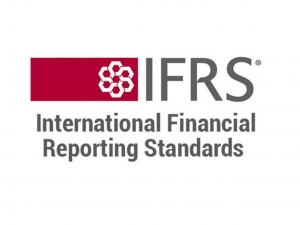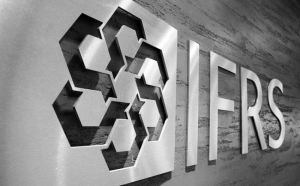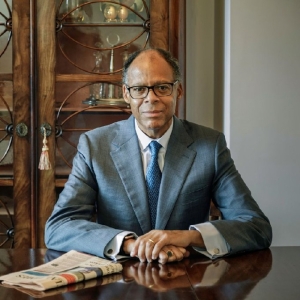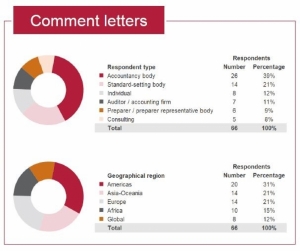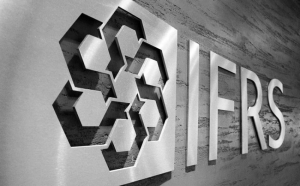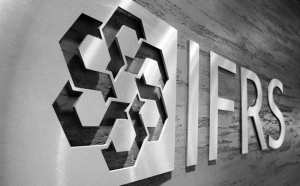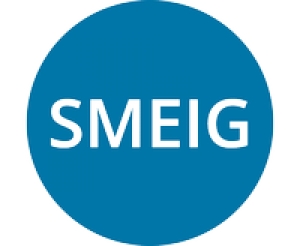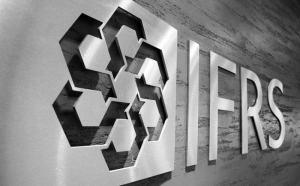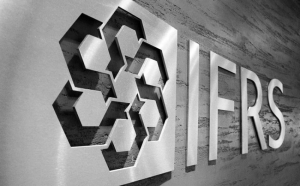عرض العناصر حسب علامة : SMEIG
تحديث المعيار المحاسبي الدولي للمؤسسات الصغيرة والمتوسطة الحجم لشهر سبتمبر 2022
تحديث المعيار المحاسبي للمعايير الدولية لإعداد التقارير المالية (IFRS) للمنشآت الصغيرة والمتوسطة هو ملخص فريق العمل للأخبار والأحداث والمعلومات الأخرى حول المعايير المحاسبية الدولية لإعداد التقارير المالية ( IFRS ) للشركات الصغيرة والمتوسطة وأنشطة الشركات الصغيرة والمتوسطة ذات الصلة. لم يتم مراجعة ملخص الموظفين من قبل مجلس معايير المحاسبة الدولية (IASB).
تقرير اجتماع مجموعة تنفيذ المشاريع الصغيرة والمتوسطة الحجم في فبراير 2021 متاح الآن
معلومات إضافية
-
المحتوى بالإنجليزية
SME Implementation Group February 2021 meeting report posted
The meeting report from the SME Implementation Group meeting held on 4–5 February 2021 is now available.
The meeting report, recordings of the meeting discussions, the agenda and other related papers are available on the meeting page. - البلد الأردن
رئيس الاتحاد الدولي للمحاسبين، يشارك أفكاره حول التحديات والفرص التي تواجه المهنة
معلومات إضافية
-
المحتوى بالإنجليزية
Bringing the future into focus
Feb 08, 2021
Alan Johnson, President of the International Federation of Accountants, shares his thoughts on the challenges and opportunities facing the profession, and the priorities for his presidential term.
1. When you joined the IFAC Board in 2015, did you envisage at that time becoming President?
Absolutely not. In fact, I didn’t know much about IFAC until 2011 when I was approached to consider joining the Professional Accountants in Business Committee, which I served on for five years. In 2015, ACCA, my member body, asked me whether I would consider putting myself forward for the board and quite honestly, I had never thought about that – partly because I wasn’t sure I would know what to do given that I didn’t have much knowledge of IFAC beyond my Professional Accountants in Business work. But then, having thought about it, I realised that I probably knew enough. I also realised the value of being a volunteer and giving back to the profession, a profession that had given me a good life and a good career internationally, so I decided to go for it. I knew it would be competitive, and I didn’t honestly expect to get it, but I was selected to my pleasant surprise.
Then, when the call came out for board members to put their names forward in January 2018 for the Deputy President position, I didn’t put myself forward because I genuinely believed that other members of the board deserved to become President and would do a better job than me. But things developed by mid-2018 and I was again asked to consider putting myself forward. It was quite late in the process, but I put my hat in the ring. As they say, the rest is history. I was appointed Deputy President and the more I learnt about the role, the more I felt confident in the role so that, by the time the election for the presidency came around, I felt I was ready.
So, that’s what happened. It wasn’t planned or envisaged. I never expected to get on the board of IFAC, let alone become Deputy President or President, but sometimes things work out.
2. And how has the work of IFAC changed over the five years of your involvement?
The profession faces many challenges, as do all professions today. Number one, we have the scrutiny of the regulators concerning the quality of audit. Sadly, corporate failures will always bring the spotlight onto the audit profession, whether we like it or not. Failures – and I would not necessarily call them audit failures because it is not as if the audit itself failed – arise for various reason, including for example when management deliberately keeps information away from auditors. Now, that is not a good enough excuse to the public because every corporate failure leads to significant loss of jobs, loss of livelihoods, loss of value to investors, and damage to the society in which businesses operate. So, I don’t want to minimise corporate failure; it’s quite serious, and we have an important role in helping prevent it as part of a broader ecosystem.
We also have to demonstrate that we operate ethically, that we act independently, and we do our best to provide independent, high-quality assurance on financial statements. We, therefore, spend a lot of time reinforcing the importance of ethical behaviour, independence and judgement. There’s a firm commitment to operate with sound and robust independence in what we do.
The other thing I would say is that we talk about the auditors when it comes to corporate failure, but we should also think about the professional accountants in the business who are responsible for performance, oversight, risk and governance. We must look at ourselves from within the corporate entities and ask: where are we as professional accountants, and is this a situation where we should blow the whistle? That’s where the profession plays a vital role and that’s why the Code of Ethics for Professional Accountants, which covers not just accountants in practice but also accountants in business and the public sector, are essential as we support our professionals and encourage them to speak out when that is needed and necessary.
You know, we talk a lot about the public interest, but if you asked me 30 years ago, when I was CFO of one of Unilever’s subsidiaries, if my job was a public interest role, I probably would have said no. We have a big role to play in explaining what public interest really means. I think the auditors get it, but I’m not sure whether professional accountants in organisations understand that they have a critical role in protecting the public interest. Yes, they are employees of an organisation. Yes, they are paid by the organisation. And yes, their careers are often dependent on those organisations. But since I got involved with IFAC, I have become aware that I’ve always had a “public interest” role. I always acted in the public interest, but I would not have defined that part of my role as it needs to be clearly defined, especially today in a world of multi-stakeholder capitalism.
So, we have a significant role to play through our member bodies to ensure that our professional accountants understand their unique roles in protecting the public interest. And part of that is making sure that private enterprises operate correctly, ethically, within the law, and do everything that is right for society – not just what is right for shareholders.
3. For many professional accounting organisations, volunteers tend to come from public practice. Given your extensive background in industry, what does the perspective of an accountant in business bring to IFAC’s standard-setting and industry-convening roles?
It’s an interesting question because that was precisely what I had in mind when I had concerns about whether I would be of any use on the IFAC board. Having said that, in all the roles I have had in business, I have always interacted with the profession. I was on the other side of discussions with auditors for many years. I was on selection panels to select auditors. I was the Chief Audit Executive at Unilever for six years and in that time, I engaged regularly with our external auditors. Even though I don’t come from that part of the profession, I understand what they do, what they need, how they operate, their challenges, and their critical role in society. And that’s why I have been able to contribute to the discussions in the Monitoring Group – because I understand the role standard-setting boards play as part of building trust and confidence in financial markets.
When I joined the IFAC board, many colleagues came from the audit and assurance side of the profession. Today, we have a much better balance of people from business and the public sector while retaining expertise from the audit and assurance profession and improving the level of representation for small- and medium-sized practices (SMPs) on the standard-setting boards and IFAC’s advisory groups. If there is one thing we should feel proud of, it is how much more diverse the board is today. I thrive in working with diversity. As a person, you learn a lot more; you become a better leader; you become a better person. By the way, diversity of thought, views, expressions and debate around the table will, more often than not, improve outcomes.
4. A feature of Chartered Accountants Ireland’s membership is the relatively high proportion of our members working overseas. What supports should professional accounting organisations offer to their overseas members to encourage loyalty to their qualification while maintaining standards?
I worked extensively in Europe, Africa and Latin America during my career, but I always had a strong affinity with Ireland through my early career in Unilever when I visited Dublin and other cities frequently. It’s a unique country that has always been a top talent provider around the world and Chartered Accountants Ireland is no exception. The Chartered Accountants Ireland qualification is highly sought-after, so it’s no surprise that there are so many Irish Chartered Accountants working worldwide, either because their companies have moved them or they sought opportunities abroad.
When I look at where we are today, the three things that stand out for me are ethics, leadership and governance. Professional accountancy organisations need to equip their members with these skills wherever they are in the world because reputation takes years to build but can be lost in a flash. We need to protect the profession’s reputation, which boils down to ethics, leadership and governance. It’s also about courage and confidence. So, when I look at what our member bodies need to do, they not only need to support their existing members, they also need to attract the brightest, best and most committed people into the profession because we are a profession of people. Robots and machines might help us be more efficient in some areas, but most of what we do is people-centred and requires good judgement. It’s essential, therefore, that we remain an attractive profession for the next generation.
If I look back at my memories of the profession, I think of long hours, hard work, no work/life balance, travelling a lot if you’re in audit and assurance, terrible for families, terrible for working mothers. Your career might pause if you’re a working mother and you take maternity leave or time away to look after young kids – that role that is still more typically assumed by women, although that is changing. As a result, the accountancy profession is not a natural first port of call for the next generation who want better work/life balance. So we must find new ways of doing what we do – not only more efficiently, but doing different things and often in different ways to make our profession attractive. I think accountancy remains very attractive and when I look at the statistics, we are a growing profession. Many young people in many countries are coming through the professional qualification so we can attract them, and that’s great – but we also have to retain them.
Purpose is a critical element in achieving that. Young Chartered Accountants want to work for an ethical company, as we all do. It’s is not just about rapid career advancement; they want to see the purpose and the impact their organisation – and by extension, they themselves – can have on society. Young people are thinking about purpose much more than I did 40 years ago. It means much more to them, and they will form their views about whom they want to work with, where they want to work, and what work they want to do based on the ethos and the purpose of organisations. And to go back to the point about the public interest, if we can make it clear why our profession is truly a public interest profession, we will remain a very attractive profession in the future.
5. Your predecessor, Professor In-Ki Joo, described the Monitoring Group’s challenges as “among the most difficult circumstances” in his memory. What opportunities do you see for IFAC as the Monitoring Group’s work takes effect?
As you know, the Monitoring Group is a group of international institutions and regulatory bodies that are working to advance the public interest in areas related to international audit standard-setting, audit quality and ethics. The initial Monitoring Group discussions started in May 2015, before I joined the IFAC board, and it remains a feature today. Today we’re in a much better place, and I can see the light at the end of the tunnel.
There will be some changes to the structure of the standard-setting boards and the process to select standard-setting board members. But whatever the outcome is, I think there is a clear recognition that the profession has developed high-quality standards for auditors, professional accountants and the public sector. The question is how we move forward in a changing environment with more agility, more speed, and more diversity – that’s what we’re discussing now.
IFAC and its member bodies will continue to play an important role in the standard-setting process. Why do I say that? First of all, we have the knowledge and expertise. We are either the preparers, users or assurers, so we must have a role because we understand what good standards look like. That’s accepted by the Monitoring Group and the other players, including the PIOB (Public Interest Oversight Board) and the standard-setting board chairs.
We also have to play a critical role in adopting and implementing international standards. A standard-setting board can write excellent standards, go through the due process, get them developed and get them approved – but indeed international standard-setters have no force of law. Standards need to be adopted and implemented by national standard-setters. That is where our profession comes in and why the profession has to stay connected to the standard-setting process, provide good quality resources to the standard-setting board and the technical teams that do the work, and – an even bigger job – facilitate adoption and implementation in jurisdictions around the world.
IFAC will clearly have a very important role in standard-setting and an even more important role in making sure that the standards get used. A standard is worth very little if it’s never implemented; sometimes we forget that.
I am much more confident today that we have the right framework in place to have proper and fruitful discussions. There is also the right understanding of each player’s relevant and relative roles, and there is an acceptance that we all have important roles to play in delivering high-quality international standards that are adopted across the world. That’s the objective of all of us, and there is no argument or disagreement about that.
6. IFAC is actively promoting the development of coherent standards for ESG. Are there pitfalls as well as opportunities for accountants as these standards are developed?
First of all, we need a truly international approach to ESG standards. At the moment, we have fragmentation with five or six bodies working on different elements of ESG standards. It isn’t joined up, and there’s no mandate to deliver. Like audit and assurance standards or accounting standards, we need a framework and structure to develop international ESG standards.
Some time ago, we concluded that the IFRS Foundation had a role to play because it has credibility, capacity, resources, and a proven track record in delivering internationally accepted standards. IFAC put out a call to action in September, which outlined the importance of one body taking responsibility for setting standards. It cannot continue to remain in the hands of five or six independent bodies without the capacity, resources, funding, and authority to deliver. The paper called for a new sustainable standards-setting board under the umbrella of the IFRS to take responsibility for developing credible, international sustainability standards that can be adopted widely across the world. Why? Because there’s an increasing demand for all organisations to report against a consistent set of high-quality standards. The demand from society, investors, stakeholders, suppliers, customers and employees is that companies deliver against a set of high, internationally comparable standards.
It goes back to the point of purpose. Whether in our profession or other professions, the next generation will want to work for companies that take this seriously. It’s one thing to say that we will deliver against the UN Sustainable Development Goals (SDGs), but the hard truth is: how do we know we’re getting there? Where’s the measurement, and against what measures? Are they consistent measures? How do we know that what a company is reporting is authentic, is accurate? That’s where our profession has an important role to play on both sides, both as preparers who help organisations implement the necessary processes and as accountants in practice who provide independent assurance over, and audit, what is reported to give credibility.
As a profession, the pitfall will be if we aren’t up to the mark in helping organisations implement the reporting regimes to meet the new standards. If we don’t do that, somebody else will. That might be a pitfall, but I see it more as an opportunity – not necessarily a commercial opportunity, more an opportunity for our profession to play our rightful role in ensuring that organisations become more sustainable and helping society, in general, become more sustainable.
This all links back very strongly to the concept of the public interest, which I have mentioned several times. Wherever you go, you will find a link to our role in the public interest – and this is a critical public interest role we must fulfil. That’s why I see it as an opportunity, but a pitfall if we fail. And if we fail, we have not fulfilled our public interest mandate and therefore don’t have a right to speak out on issues.
7. What other areas of focus would you like to bring to bear during your tenure as IFAC president?
Beyond the important points I’ve already discussed, I have canvassed intensely for increased professionalism in the public sector. I was on the board of the UK Department for International Development for just over two years and during that time, I chaired the Audit and Risk Assurance Committee. That period really shaped my awareness of how higher levels of professionalism, particularly in terms of the accountancy profession, could make a massive difference to the public sector. It was an ‘aha’ moment for me, and I want to drive that agenda much harder during my presidency. And we are starting from a position of strength, as we now have great public sector representation on the IFAC board. When I joined I think there was one public sector member; we now have four out of 22 and many more on our advisory groups.
Another area of focus is what I call ‘Save the SMEs’. Small- and medium-sized enterprises (SMEs) are critical to every economy, large or small. Big corporates get lots of attention, but we often forget that big corporates not only rely on SMEs, but a significant part of their supply chain is also made up of SMEs. The largest employer worldwide is the SME sector, so we need to save the SMEs by ensuring that they have access to high-quality professional accountants. We can do that by advocating to ensure that they employ professional accountants, and ensuring that the SMPs that support them have a high profile on our agenda.
Who is Alan Johnson?
Alan Johnson became IFAC President in November 2020, having previously served as Deputy President from 2018-2020 and as a board member since November 2015. He was nominated to the IFAC board by the Association of Chartered Certified Accountants (ACCA).
Alan is a former non-executive director of Jerónimo Martins SGPS, SA, a food retailer with operations in Portugal, Poland, and Colombia, having completed his board mandate in 2016. He is currently the independent chair of the company’s Internal Control Committee. Previously, Alan was Chief Financial Officer of Jerónimo Martins from 2012 to 2014. Between 2005 and 2011 he served as Chief Audit Executive for the Unilever Group. Alan also served as Chief Financial Officer of Unilever’s Global Foods businesses and worked for Unilever for 35 years in various finance positions in Africa, Europe and Latin America.
Alan was a member of the IFAC Professional Accountants in Business Committee between 2011 and 2015, a member of the ACCA’s Market Oversight Committee between 2006 and 2012 and chair of the Accountants for Business Global Forum until 2018. He was a member of the board of Gildat Strauss Israel between 2003 and 2004. Alan is the chair of the board of governors of St. Julian’s School in Portugal and chairs its Finance and Bursaries Committees. In October 2016, he was appointed to the Board of Trustees of the International Valuation Standards Council and chairs its audit committee. Between July 2018 and September 2020, he was a non-executive director of the UK Department for International Development (DFID) and chaired its Audit and Risk Assurance Committee. In January 2021, he joined the board of Imperial Brands plc as a non-executive director.
Source: The International Federation of Accountants.
تحديث المعايير الدولية لإعداد التقارير المالية لشهر ديسمبر 2020 للشركات الصغيرة والمتوسطة
تحديث المعايير الدولية لإعداد التقارير المالية للمنشآت الصغيرة والمتوسطة هو ملخص فريق العمل للأخبار والأحداث والمعلومات الأخرى حول معيار IFRS للشركات الصغيرة والمتوسطة
تحديث المعايير الدولية لإعداد التقارير المالية (IFRS) للشركات الصغيرة والمتوسطة لشهر سبتمبر 2020
تحديث المعايير الدولية لإعداد التقارير المالية للمنشآت الصغيرة والمتوسطة هو ملخص فريق العمل للأخبار والأحداث والمعلومات الأخرى حول المعايير الدولية لإعداد التقارير المالية للمؤسسات الصغيرة والمتوسطة
المراجعة الشاملة للمعايير الدولية لإعداد التقارير المالية للشركات الصغيرة والمتوسطة
تعيين أعضاء جدد في مجموعة تنفيذ المشاريع الصغيرة والمتوسطة (SMEIG)
تعيّن مؤسسة المعايير الدولية لإعداد التقارير المالية (IFRS) أعضاءً جددًا في مجموعة تنفيذ المشاريع الصغيرة والمتوسطة
تحديث المعايير الدولية لإعداد التقارير المالية للشركات الصغيرة والمتوسطة لشهر يونيو 2020 متاح الآن
شارك برأيك حول تعديل المعايير الدولية لإعداد التقارير المالية للشركات الصغيرة والمتوسطة
معلومات إضافية
- المحتوى بالإنجليزية The IFRS for SMEs Standard Update is a staff summary of news, events and other information about the IFRS for SMEs Standard and related SME activities. The staff summary has not been reviewed by the International Accounting Standards Board (Board).

